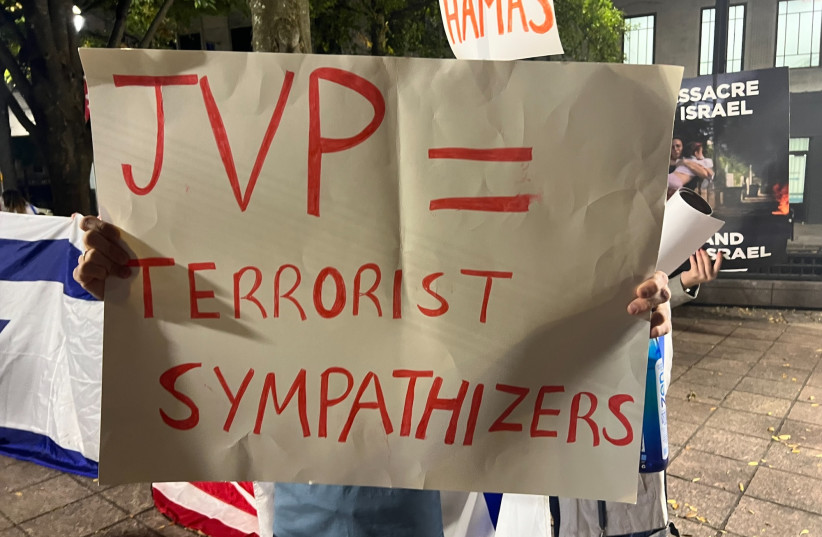Anti-Israel group Jewish Voice for Peace published a special edition of an anti-Zionist Passover Haggadah, loosely based on the traditional text read during the first night of Passover, which revolves around the redemption of the ancient Israelites from the land of Egypt on their way to the Land of Israel.
The "revised" Haggadah features untraditional content such as commending Palestinian Shaheeds or Islamic martyrs, calling to “free Palestine from the river to the sea,” quoting Palestinian writers, blessing a deity in the feminine form, and even the text of the Partisan Song, implying parallels between the Jewish victims of Nazism in the Warsaw Ghetto Uprising and Gaza.
Other examples of content include referring to Israel as a “Zionist settler-colonial project,” calling to divest from the Jewish National Fund, special poems dedicated to Rafah, pre-written letters to Jewish communities and institutions as well as to editors of The New York Times and calls to “resist Zionism,” alongside several instances of grammatical and syntactical errors in Hebrew and an abundance of Palestinian-appropriated symbolism such as watermelons, olives, strawberries, and more.
Divided into four parts parallel to the four elements, the anti-Israel group also made use of the Seder for calling to refund UNRWA despite proven active participation of its members and infrastructure in Hamas terrorist operations, as well as to commemorate Refaat Alareer, a Popular Front for the Liberation of Palestine militant who deemed “most Jews are evil,” and quote Jerusalem activist Mohammed El-Kurd who wished “every Zionist” to “burn in… hell.”

One distinctive passage found in the revised Haggadah relates the “ten spiritual plagues of Zionism,” accusing the Jewish national liberation movement of bringing about the demise of almost every thinkable positive aspect of life including humanity, empathy, soul, perspective, allies, and truth.
The text also mourns “Jewish communities lost to the power of domination and ownership,” lamenting the participants’ shared feelings of ostracism from the Jewish world, rejection by their families and friends, and “threats and doxxing” by “powerful institutions,” adding that “there is bitter goodness in finding [an] anti-Zionist Jewish home.”
Exploiting traditional Seder motifs to bring about an end to the Jewish State
In the foreword to their edition of the Haggadah, the anti-Israel group claimed that “Passover is ours to own and continuously define,” accusing Israel of co-opting “a thousand-year-old tradition for oppression” and of “using Jewish traditions as weapons against Palestinians.” They also claimed to be “reclaiming the holiday of liberation” and “building [Judaism] beyond Zionism.” Finally, this section ends by arguing that “this year’s Jewish holiday of liberation urges every one of us to step up our commitment to the liberation of the Palestinian people,” ending with an incorrect blessing of “Chag sameach Pesach.”
Later in the text, the ancient Israelites are accused of “killing and displacing people in pursuit of the Promised Land,” while the Israeli government is portrayed as the modern Pharaoh, pointing a finger at US citizens who pay taxes in the country and are thus “complicit” in Israel’s “military genocide of Gaza.”
The text also includes ceremonial instructions based on the traditional parts of the Seder night, such as drinking cups of wine “to the reinvention of Jewishness (sic.), not just beyond zionism (sic.), but without the things that make zionism possible.”
Additionally, Urchatz, the traditional washing of the hands at the beginning of the Seder night, is dedicated to “Palestinian People, Land, and Waters,” unabashedly drawing parallels between the repercussions of the atomic bombs dropped on Hiroshima and Nagasaki and the establishment of Israel and its effects on Palestinians.
Yachatz, the ritual breaking of the matzah during the Seder, is likened to the breaking of “the spells” of those “systems of empire and domination” and “oppressive institutions,” also invoking a call to divest from the Israeli economy.
Similarly, Magid, the main part of the Haggadah which revolves around telling the story of the Israelites’ exodus from Egypt, features peculiar instructions such as urging participants to lift the Seder plate over an empty space symbolizing Gaza, calling on the Shekhinah (Godly presence) to bless the Palestinian people, urging participants to ritually dip their food repeatedly “until Palestine is free,” and linking the four traditional questions to “genocide,” “horrors,” and “crimes” of Israel.
Likewise, Tzafun, the ritual search for the last part of matzah allowed to be eaten during the Seder, was revised to refer to Palestinians searching for family and colleagues “buried beneath the rubble.”
Towards the end, a blessing to the “interest form, the QR code, the recruitment spreadsheet with its infinite containers brimming with affinities” is also present.
JVP – tokenizing Jewishness to ‘drive a wedge’ and combat Zionism
Jewish Voice for Peace is a charity and lobbying group based in the US. Formed in the mid-1990s, their reported strategy is to drive a “wedge” within the Jewish community in the US to dilute support for Israel among the Jewish community.
The organization describes itself as “the largest progressive Jewish anti-Zionist organization in the world,” belonging to “Jewish leftists” who “fight for the liberation of all peoples.” The group has shown instances of open support for terrorism, including the publication of a poster featuring Palestinian terrorist Leila Khaled alongside the slogan “L’chaim Intifada!”
Lately, the organization made headlines for its active participation in anti-Israel protests alongside groups sympathizing with armed Palestinian militias and terror groups, such as Palestinian Youth Movement, Students for Justice in Palestine, and Within Our Lifetime.
These stances notwithstanding, militant Palestinian groups such as the now-defunct Jisr Collective have accused JVP, much to their dismay, of being “subtly Zionist” for receiving funds from liberal organizations and daring to promote “people-to-people normalization.” The militant group also claimed that JVP was “centering imperialist American Jews to dominate the direction of Palestinian organizations” and accused them of “using Palestinians as a pawn in this power struggle, often co-opting Palestinian art, martyrs, and thinkers as their shield.”
